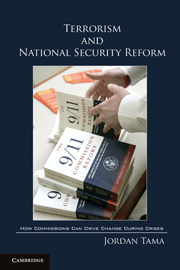Book contents
- Frontmatter
- Contents
- List of Figures and Tables
- Acknowledgments
- 1 Commissioning Reform
- PART ONE PATTERNS OF COMMISSION INFLUENCE
- 2 A Theory of Commission Influence
- 3 The Impact of National Security Commissions
- PART TWO COMMISSIONS AND COUNTERTERRORISM POLICY
- PART THREE CONCLUSION
- Appendix A Construction of the Data Set
- Appendix B National Security Commissions, 1981–2006
- Appendix C List of People Interviewed
- References
- Index
3 - The Impact of National Security Commissions
Published online by Cambridge University Press: 05 June 2012
- Frontmatter
- Contents
- List of Figures and Tables
- Acknowledgments
- 1 Commissioning Reform
- PART ONE PATTERNS OF COMMISSION INFLUENCE
- 2 A Theory of Commission Influence
- 3 The Impact of National Security Commissions
- PART TWO COMMISSIONS AND COUNTERTERRORISM POLICY
- PART THREE CONCLUSION
- Appendix A Construction of the Data Set
- Appendix B National Security Commissions, 1981–2006
- Appendix C List of People Interviewed
- References
- Index
Summary
In Chapter 2, I explained how a commission's distinct political credibility can enable it to catalyze reform. My argument generated three hypotheses about the conditions in which panels are most likely to spur change: Commissions have greater impact on policy if they are (1) formed in response to a crisis, (2) established by the executive branch, or (3) given a narrow mandate. I also formulated two alternative hypotheses that represent other plausible views of commission influence: (1) Panels have more impact on policy if they possess greater expertise, and (2) commissions rarely cause policy change to occur.
In this chapter, I test my hypotheses and the first alternative hypothesis through statistical analysis of an original data set of all fifty-one commissions that reported on national security issues between 1981 and 2006. (The second alternative hypothesis is tested in Chapters 4–6.) The analysis features two original measures of commission impact and, to my knowledge, represents the first effort to investigate the sources of a commission's ability to shape policy through rigorous statistical testing. Although limiting the analysis to national security commissions might reduce my ability to draw general conclusions about all commissions, this restriction enables me to evaluate in some depth the impact of every commission over a twenty-six-year period. Chapter 7 considers whether commissions addressing issues other than national security might have different patterns of influence.
- Type
- Chapter
- Information
- Terrorism and National Security ReformHow Commissions Can Drive Change During Crises, pp. 44 - 72Publisher: Cambridge University PressPrint publication year: 2011



